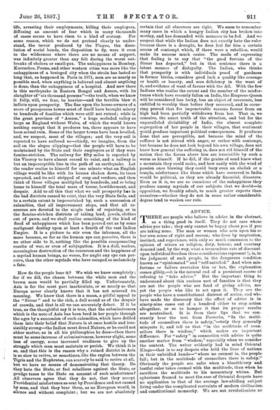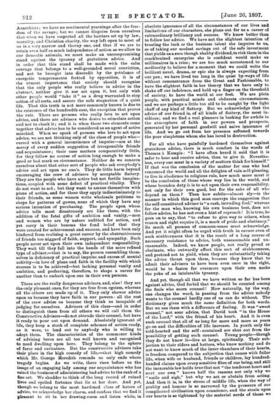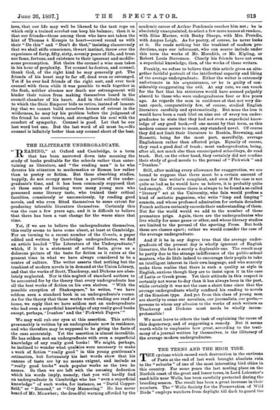ADVICE.
THERE are people who believe in advice in the abstract, as a thing good in itself. They do not care whose advice you take; they only cannot be happy about you if your are taking none. The man or woman who acts upon his or- her own sense of right and reason; who lives by inspiration,. instinct, and experience, with only so much concession to the- opinion of others as religion, duty, honour, and courtesy demand (and, by the way, what a tremendous rate of discount upon individual freedom these considerations represent !), is, in the judgment of such people, in the dangerous condition. known as " opinionated " and "self-satisfied." And when mis- fortune or failure overtakes him or her, the explanation comes glibly,—it is the natural end of a persistent course of refusing to "take advice." But the important thing to understand about this curious sect of fanatics is that they are not the people who are fond of giving advice, nor yet the people who like to act upon it. They are the people who have a constitutional distrust of action, and who- have made the discovery that the effect of advice is in ninety-nine cases out of a hundred either to stop action altogether, or so to hamper it that its proper results are neutralised. It is from their lips that we con- stantly hear the text from Proverbs, "In the multi- tude of counsellors there is safety,"—Only they generally misquote it, and tell us that "in the multitude of coun- sellors there is wisdom," which makes an important difference. For " safety " in connection with advice is quite- another matter from "wisdom," especially when we consider- the context. The writer evidently had in mind Oriental Kings—that is to say despots who hold the lives of nations, in their unbridled hands—" where no counsel is, the people- fall ; but in the multitude of counsellors there is safety."' Obviously the people are safer when a bloodthirsty and lustful ruler takes counsel with the multitude, than when he, sacrifices the multitude to his momentary whims. But aphorisms framed to meet the case of Oriental despots have no application to that of the average law-abiding subject. living under the complicated restraints of modern civilisation and constitutional monarchy. We are not revolutionists car Anarchists ; we have no sentimental yearnings after the free- dom of the savage ; but we cannot disguise from ourselves that when we have respected all the barriers set up by law, morality, and Christian charity, the way left open to most of U9 is a very narrow and thorny one, and that if we are to retain even half as much independence of action as we allow to our domestic animals, we must make an uncompromising stand against the tyranny of gratuitous advice. And in order that this stand shall be made with the calm courage that belongs to a well-grounded moral conviction, and not be brought into discredit by the petulance of energetic temperaments fretted by opposition, it is of the utmost importance that society should recognise that the only people who really believe in advice in the abstract, neither give it nor act upon it, but only wish other people would "take it" as a drug warranted to stop action of all sorts, and assure the safe stagnation of a quiet life. That this truth is not more commonly known is due to the existence of the hundredth case, the exception that proves the rule. There are persons who really love to act upon advice, and there are advisers who desire to stimulate action and not to check it; and it is when these two elements come together that advice has to be considered as an agent of active mischief. When we speak of persons who love to act upon advice, we are not thinking only of the class of people who— cursed with a general incontinence of impulse—are at the mercy of every sudden suggestion of irresponsible friends and acquaintance ; their case matters comparatively little, for they follow no course of action long enough to make a good or bad mark on circumstance. Neither do we concern ourselves about that other sort of people who ask everybody's advice and act upon no one's. They do little harm beyond encouraging the crew of advisers by acceptable flattery. They are the people who have active but not fertile imagina- tions, coupled with some defect of practical vitality. They do not want to act ; but they want to amuse themselves with plans of action, and for these they apply indiscriminately to
their friends, as some women write wholesale petitions to shops for patterns of gowns, none of which they have any serious intention of purchasing. The people upon whom advice tells most disastrously are like these, with the addition of the fatal gifts of ambition and vanity,—men and women who are by nature unfitted for action, and yet carry in their bosoms the fond belief that they were created for achievement and success, and have been only hindered from realising a great career by the obstructiveness of friends too niggard of faith, support, and sympathy. Such people never act upon their own independent responsibility.
They wait till they fall into the bands of the more refined type of adviser,—that is to say, the person resembling them.
selves in deficiency of practical impulse and excess of mental activity—in love of plans and faith in the facility with which success is to be achieved—but lacking personal vanity and ambition, and preferring, therefore, to shape a career for another than to embark upon one in their own persons.
These are the really dangerous advisers, and, alas ! they are the only pleasant ones, for they are free from egoism, whereas all the others are made up of it. They only shower advice upon us because they have faith in our powers : all the rest of the crew advise us because they think as incapable of judging for ourselves. Advisers of this class—and in order to distinguish them from all others we will call them the Constructive Advisers—do not obtrude their counsel, but have it ready to pour out upon demand. Absolutely ignorant of life, they keep a stock of complete schemes of action ready, as it were, to lend out to anybody who is willing to .adopt them. The characteristics of the commoner kinds of advising bores are all too well known and recognised to need dwelling upon here. They belong to the sphere of farce and caricature. But the constructive advisers take their place in the high comedy of life,—that high comedy which Mr. George Meredith reminds us only ends where tragedy begins. As we write, there rises before us the image of an engaging lady among our acquaintance who has 'raised the business of administering bad advice to the rank of a fine art. We shudder to think of the long record of ruined lives and spoiled fortunes that lie at her door. And yet, though we belong to the most hardened class of haters of advice, we acknowledge her charm, and confess that we find it pleasant to sit in her drawing-room and listen while, in
absolute ignorance of all the circumstances of our lives and limitations of our characters, she plans out for us a career of extraordinary brilliancy and success. We know better than to follow her advice. We have not the slightest intention of trusting the lack or the business talent she imputes to us, or of taking our modest savings out of the safe investment that yields us a sure though shabby dividend, to risk them in the crackbrained enterprise she is confident would make us millionaires in a trice ; we are too much accustomed to our mediocrity to believe for a moment that we could write the brilliant novel, drama, or epic she is always expecting from our pen ; we have lived too long in the quiet by-ways of life without remonstrance from the Great and Fashionable, to have the slightest faith in her theory that we have only to shake off our indolence, and hold up a finger on the threshold of society, to have the world at our feet. We are plain people, with practical minds and obdurate circumstances, and we are perhaps a little too old to be caught by the light chaff of any kind of flattery. But we acknowledge that the advice of our friend is, of all kinds of flattery, the most in- sidious; and we find a real pleasure in basking for awhile in the atmosphere of faith in our powers and prospects, generated by her personal goodwill and naive ignorance of life. And we go out from her presence softened towards the poor simpletons whom she has lured to destruction.
For all who have painfully hardened themselves against gratuitous advice, there is much comfort in the words of Thomas a Kempis : "I have often heard it said that it is safer to hear and receive advice, than to give it. Neverthe- less, every one must in a variety of matters think for himself." If that was the conclusion of the matter for one who had renounced the world and all the delights of vain self-pleasing, to live in obedience to religious rule, how much more must it be the conclusion of those whose way lies in the world, and whose bounden duty it is to act upon their own responsibility, not only for their own good, but for the sake of all who depend on them ? Then how subtle—almost sly—is the manner in which this good man conveys the suggestion that the self-constituted adviser is "a rash, intruding fool," whereas for the man who, knowing his own business best, does not follow advice, he has not even a hint of reproach ! It is true, he goes on to say, that "to refuse to give way to others, when reason and right require it, is a mark of pride and obstinacy." So much all persons of common-sense must acknowledge. And yet it might often be urged with truth in excuse even of such stubbornness that it is the result of a long course of necessary resistance to advice, both unseasonable and un- reasonable. Indeed, we know people, not really proud or obstinate, who outwardly affect this sort of stubbornness, and pretend not to yield, when they are substantially taking the advice thrust upon them, because they know that to admit their advisers to have been even once in the right, would be to fasten for evermore upon their own necks the yoke of an intolerable tyranny.
And yet, though all that we have written so far has been against advice, God forbid that we should be counted among the fools who scorn counsel! How naturally, by the way, one changes the word, in passing from the advice nobody wants to the counsel hardly one of us can do without. The dictionary gives much the same definition for both words. But we use them with a difference of feeling. It was "sweet counsel," not soar advice, that David took "in the House of the Lord," with the friend of his heart. And it is even such counsel that all of us long for more and more as years go on and the difficulties of life increase. In youth only the cold-hearted and the self - contained are shut out from the possibility of getting such counsel. Young people—though they do not know it—live at large, spiritually. Their sub- jection to their elders and betters, who know nothing and do not want to know much of the inner chambers of their hearts, is freedom compared to the subjection that comes with fuller life, when wife or husband, friends or children, lay hundred- handed claims upon every sensitive fibre of our being, and still the inexorable law holds trite that not "the tenderest heart and next our own" knows half the reasons not only why we "smile and sigh," but why we act or abstain from acting. And then it is, ha the stress of middle life, when the way of probity and honour is so narrowed by the pressure of our complicated civilisation upon conscience, and the strain upon our hearts is so tightened by the material needs of those we
love, that our life may well be likened to the taut rope on which only a trained acrobat can keep his balance; then it is that our friends—those among them who have not taken the hint of Thomas Kempis to heart—crowd round us with their "Do this" and "Don't do that," insisting clamorously that we shall stifle conscience, thwart instinct, throw over the experience of forty, fifty, sixty, seventy years of life, and trust our fame, fortune, and existence to their ignorant and meddle- some presumption. Not theirs the counsel a wise man takes in his hour of perplexity. Yet counsel he desires, and counsel, thank God, of the right kind he may generally get. The friends of his heart may be far off, dead even or estranged. Yet if he ever had friends of the right sort, and ever took counsel with them while it was possible to walk together in the flesh, neither absence nor death nor estrangement will hinder their voices from making themselves heard in the council chamber of his heart. And in that solitude within, to which the Stoic Emperor bids us retire, instead of lament- ing that we cannot build ourselves houses of retreat in the wilderness, he may lay his problem before the judgment of the friend he most trusts, and strengthen his soul with the comfort of sympathy. Counsel is good. Let that be our last word but one. But the last word of all must be,—No counsel is infinitely better than any counsel short of the best.




















































 Previous page
Previous page